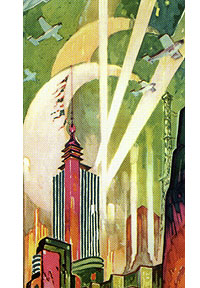
Office: HGH 210; phone: (408) 924-5378
Email: wooda@email.sjsu.edu
Web: http://www.sjsu.edu/faculty/wooda

|
Dr. Andrew Wood Office: HGH 210; phone: (408) 924-5378 Email: wooda@email.sjsu.edu Web: http://www.sjsu.edu/faculty/wooda |
 "Dialta had said that the Future had come to America first, but had finally passed it by. But not here, in the heart of the Dream. Here, we'd gone on and on, in a dream logic that knew nothing of pollution, the finite bounds of fossil fuel, or foreign wars it was possible to lose . . . Behind me, the illuminated city: searchlights swept the sky for the sheer joy of it. I imagined them thronging the plazas of white marble, orderly and alert, their bright eyes shining with enthusiasm for their floodlit avenues and silver cars. It had all the sinister fruitiness of Hitler propaganda.."
"Dialta had said that the Future had come to America first, but had finally passed it by. But not here, in the heart of the Dream. Here, we'd gone on and on, in a dream logic that knew nothing of pollution, the finite bounds of fossil fuel, or foreign wars it was possible to lose . . . Behind me, the illuminated city: searchlights swept the sky for the sheer joy of it. I imagined them thronging the plazas of white marble, orderly and alert, their bright eyes shining with enthusiasm for their floodlit avenues and silver cars. It had all the sinister fruitiness of Hitler propaganda.."
Reading: Gibson
Notes: Making Sense of the Gernsback Continuum
Notes: Organizing Utopia
Activity: Looking forward from the year 1900
Off-campus webpages
Bruce Sterling, The Future? You Don't Want to Know
Mark/Space, Definition of Utopia
PBS, Predictions taken from The Ladies Home Journal - 1900
Pressburger Zeitung, In the Year 2000
Steve Sidman, Yesterday's Predictions
Society for Utopian Studies, Utopian Links
Tapeworm, Echoes Of Futures Past
Time Magazine, 1900 vs. Now
Brenda Tooley, Utopia: Convention and Change
Ursula Hoffmann, Utopia: Lehman Scholars' Seminar
Note: These pages exist outside of San Jose State University servers and their content is not endorsed by the page maintainer or any other university entity. These pages have been selected because they may provide some guidance or insight into the issues discussed in class. Because one can never step into the same electronic river twice, the pages may or may not be available when you request them. If you have any questions or suggestions, please email Dr. Andrew Wood.